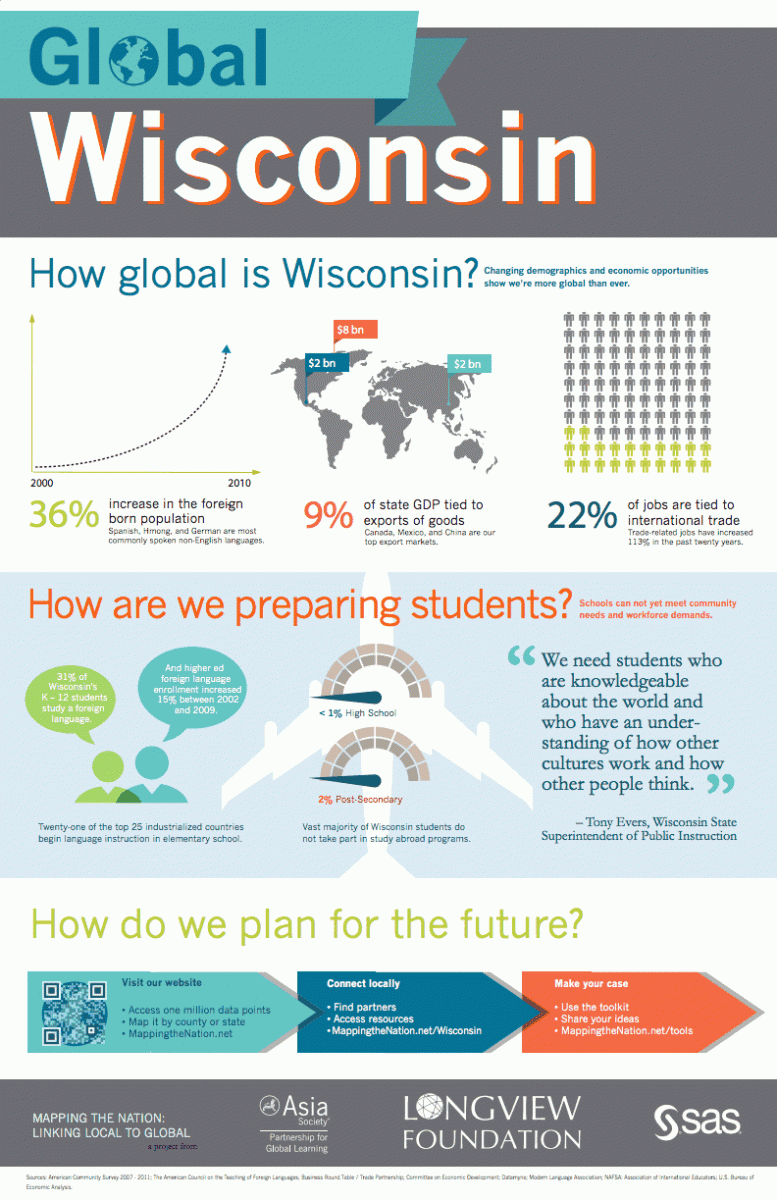Wisconsin
Policymakers, universities, and schools pull together to create global learning opportunities for students. The result? So far, a new global certificate option for graduates. Read on.

World Languages
Wisconsin has a very strong state world language association (WAFLT) with a fall convention of 900 attendees annually. WAFLT also provides professional development throughout the year and collaborates with the Wisconsin Department of Public Instruction (DPI) on many initiatives.
World language enrollment has been steady for many years and hovers slightly above 50% of the total high school student population (about 53% at this point). State statute mandates that each district provides the opportunity for each student to learn a world language beginning in grade 7. Small districts find it hard to provide that opportunity, while more affluent districts increase their menu of languages and add world language learning opportunities at the elementary level. Spanish is by far the strongest language with French and German well behind and declining. Chinese enrollment is increasing but still at a very low level (about 1% of the total student population).
College graduation requirements are two years of a world language (including the School of Education). The College of Letters and Sciences at the University of Wisconsin-Madison requires four years. That requirement can be satisfied by high school world language credits. Information is available here.
Wisconsin's Global Education Achievement Certificate requires four years of world language learning at the high school level. This is a voluntary certificate program but it is hoped that it will encourage enrollment in world language classes. Other requirements in this Certificate program are four credits in globally framed courses other than world languages, independent reading and reflection, participation in school wide international events and opportunities as well as a global service learning requirement. Details can be found at www.globalwisconsin.org.
Teacher Preparation and Professional Development
Teacher education programs at Wisconsin's public and private colleges and universities often include a global education component. There is growing recognition that globally competent teachers are a vital corner stone of successful global education at the local level. Study-abroad experiences are required of candidates for a teaching license in world languages.
Professional development is available through the area studies centers (Title VI) at UW Madison and UW Milwaukee as well as the Institute of World Affairs at UW Milwaukee. Those programs are strong and readily available to all teachers.
The Wisconsin Department of Public Instruction has one dedicated staff member for international/global and world languages education. Collaboration with associations or groups across the state is vital for progress in global education strategies. Those groups include, but are not limited to WAFLT and Global Wisconsin Inc. Other statewide groups collaborate when approached. At this point, this statewide collaboration is showing some good results. The Global Youth Summits and the Global Education Achievement Certificate are two examples of our work during recent years.
The Wisconsin State Superintendent established the International Education Council several years ago. All major education institutions K-16) are represented on the Council. Business representation is desired. The Council meets two or three times during a calendar year to discuss institutional support and action for global education.
Workforce Development
Wisconsin is thinking about global education as basic to good citizenship and employment. Technical colleges are emerging players in this context. Wisconsin employers have articulated their interest in and need for a globally competent workforce. Coalitions between businesses need to be strengthened. Public awareness of the global connections in agriculture needs to be raised in a rural state like Wisconsin.
Common Core
The discussion in this area is most visible in the area of disciplinary literacy and world language learning. (Meeting notes here.) Whenever possible, the Wisconsin Department of Public Instruction infuses the definition of global competence and the matrix in conversations about implementing Common Core State Standards. Teacher effectiveness models may offer another opportunity to infuse proficiency based world language instruction and global learning in the required learning outcomes.
Resources
Wisconsin Association for Language Teachers (WAFLT)
UW Madison Area Studies Centers
UW Milwaukee Center for Latin American and Caribbean Studies
UW Milwaukee Institute of World Affairs
The State Superintendent’s International Education Council (Website available soon)
Case Studies and Videos
The website www.globalwisconsin.org gives a comprehensive overview of state initiatives in global education. That includes information on Wisconsin’s Global Youth Summits, the Global Education Achievement Certificate, videos of interesting school projects, and the Wisconsin Global Schools Network.
Contact
Gerhard Fischer, PhD
[email protected]
Tel: 608-267-9265
Global Competence Resources
Asia Society Partnership for Global Learning and the Council of Chief State School Officers (CCSSO) partnered to define global competence and the skills and abilities that students need to demonstrate to be globally competent.
